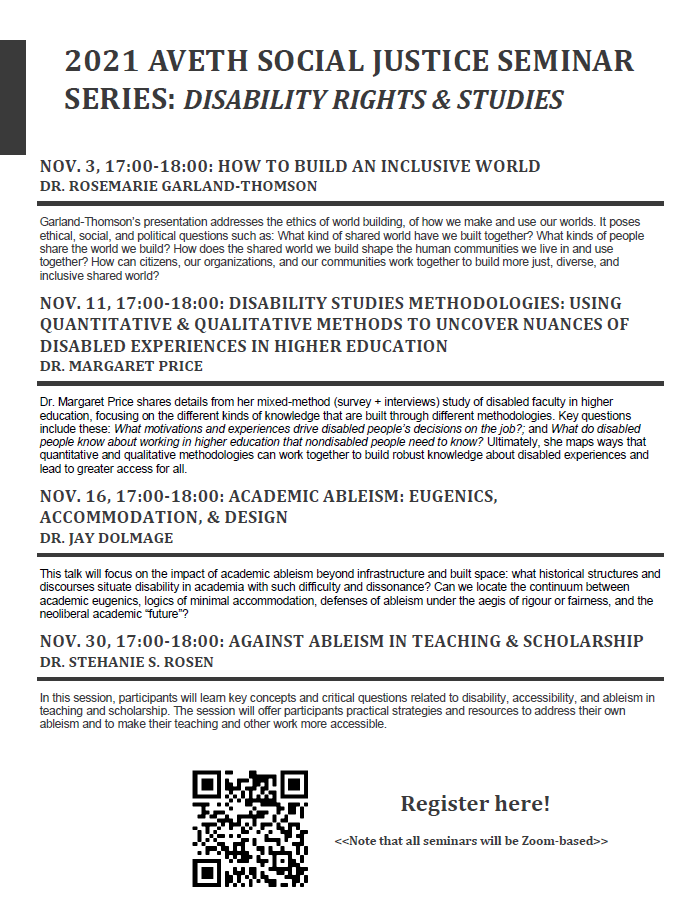How to build and inclusive world
– Dr. Rosemarie Garland-Thomson
Download Transcript
Academic Ableism: Eugenics, Accomodation & Design
– Dr. Jay Dolmage
Download Transcript
Using quantitative & qualitative methods to uncover nuances of disabled experiences in higher education
– Dr. Margaret Price
Download Transcript
Against Ableism in Teaching & Scholarship
– Dr. Stephanie S. Rosen
Download Transcript
2021 AVETH Social Justice Seminar Series
The 2021 AVETH Social Justice Seminar Series is focused on disability rights and studies. Each year, this seminar series concentrates on a theme to create scholarly opportunities to learn more about social justice. We hope participation in the seminar series stimulates your curiosity and interest to be deliberately inclusive in your administrating, leadership, advising, mentoring, and teaching. Deepening your understanding of disability is important for everyone, and it is essential to promote the growth and evolution of ETH in addition to the newly green-lite Barrier-Free Project at ETH (https://bit.ly/3aTzl2B). If you have any questions or comments or would like to become more involved in social justice at ETH please reach out to diversity[at]aveth[dot]ethz[dot]ch or visit our website (https://www.aveth.ethz.ch/diversity/).
Registration link: https://forms.gle/q5iY7M7CLbzWFr1s9

2020 AVETH Diversity & Inclusion Seminar Series
In the autumn semester of 2020, the AVETH Diversity Team organised their first seminar series on diversity & inclusion in science. Consisting of four-parts, we invited world renowned scientists and community leaders exploring unique themes at the intersections of social justice and science. Each seminar was specifically aimed at better understanding systems of oppression in academia, with a particular emphasis on racism, and how to make changes which foster justice and equity in the classroom, lab, and institution.
Inclusive Pedagogy Approaches for Diverse Learning Environments
– Dr. Catherine Shea Sanger
Transforming Institutional Culture
– Dr. Shaila Kotadia
Building an anti-racist lab
– Dr. Bala Chaudhary
Identity in Ecology and Evolution
– Dr. Maria Miriti
Read our summaries of the most important take-home messages of the seminars
The seminar series aimed to improve our collective understanding of oppressive structures in academia and how we can work together in dismantling them. Led by world renowned scientists and community leaders, the discussions explored inclusive pedagogic approaches in higher education, transforming institutional culture, how to build and support an anti-racist lab, and the importance of biocultural diversity in science. With more than 250 individuals joining the virtual seminar series from all over the world, the discussions were fruitful and engaging. The seminars provided a space for participants to directly interact with the speakers. Each speaker touched on some personal experiences and challenges as well as broader frameworks aimed at provoking and guiding audience members to make change. The speakers described how we as individuals can influence and engage our institutional and community leaders in shifting oppressive structures towards ones that promote inclusivity and justice.
Inclusive Pedagogy Approaches for Diverse Learning Environments – Dr. Catherine Shea Sanger (she/her) – Senior Lecturer of Global Affairs and the Director at the Center for Teaching and Learning at the Yale-NUS College in Singapore.
LDr. Sanger discussed ways to proactively harness diversity in teaching using inclusive pedagogy and universal design of learning. She discussed how the role of an instructor is to facilitate and generate student learning, and that this can only be achieved through inclusive practices, many of which were discussed during the seminar including untimed or take-home exams and how to form small groups without tokenizing certain groups. Dr. Sanger discussed the importance of centering students in the learning process and moving from a model of equality to one of inclusion and belonging. To learn more about Dr. Sanger’s research and pedagogical approaches, please check out her open-access book chapter, Inclusive Pedagogy and Universal Design Approaches for Diverse Learning Environments in the open-access book Diversity and Inclusion in Global Higher Education.
Transforming Institutional Culture – Dr. Shaila Kotadia (she/her) – Director of Justice, Equity, Diversity and Inclusion for the Human Resources Group in the School of Medicine at Stanford University
Dr. Kotadia discussed how oppression on the institutional level needs synergies between grassroot initiatives and administrative leadership and emphasized the importance of coalition building. Dr. Kotadia engaged participants by asking them to think about the structure of their institution, including the power distribution, accountability measures, and cross-departmental collaborations. She encouraged listeners to think about how we as individuals are engaging with the community and benefiting from status quo structures. Dr. Kotadia further facilitated participants to reflect deeply around the following questions: why do you want to put in the work to understand oppressive structures? How are you working together across groups and departments? How are you communicating with leadership? These are questions which encourage reflection beyond the sixty minute seminar that can help develop an understanding and approach for making institutional change. To learn more about Dr. Kotadia’s work, please visit the Stanford Medicine Diversity website. We encourage you to follow Dr. Kotadia on Twitter at @ShatotheKo.
Building an anti-racist lab – Dr. Bala Chaudhary (she/her) – Professor in the Department of Environmental Science and Studies at DePaul University in Chicago, Illinois, USA.
Dr. Chaudhary focused her seminar on how to build an antiracist lab. She discussed the differences between being “not-racist” versus being anti-racist, quoting scholar Ibram X. Kendri: “One either allows racial inequalities to persevere, as a racist, or confronts racial inequalities, as an antiracist. There is no in-between safe space of ‘not racist.” Dr. Chaudhary mentioned common mistakes beginners make in STEM from unevolved viewpoints and weak policies which can unintentionally harm BIPOC people, such as objectifying thought experiments (i.e. questioning the inherent value of BIPOC in STEM), mistakenly viewing race as grounded in biology, and hijacking discussions about race to discuss other types of diversity without being intersectional. Dr. Chaudhary made a point that despite the title of her seminar focused on “ten simple rules”, cultivating an anti-racist lab is not easy, but it can and should begin with facilitating and joining in on discussions about race with your lab mates. To learn more about the tips and advice Dr. Chaudhary described during her seminar, please check out her recent publication, Ten tips for building an antiracist lab. We encourage you to follow Dr. Chaudhary on Twitter at @BalaChaudhary.
Identity in Ecology and Evolution – Dr. Maria Miriti (she/her) – Professor in the Department of Evolution, Ecology, and Organismal Biology at Ohio State University in the US.
Dr. Miriti discussed the importance of cultivating diversity and retention in the sciences, emphasizing her area of scholarship in ecology and evolution. She mentioned the disconnect between ‘caring about diversity’ and ‘valuing diversity’ in academic institutions. Dr. Miriti described clear strategies to combat the “leaky pipeline,” emphasizing abandoning tokenism, fostering self-efficacy, and promoting inclusive research experiences and opportunities. Dr. Miriti shared a wealth of statistics on diversity in ecology and evolution from an intersectional lens which uniquely appealed to the quantitative scientific seminar audience. To learn more about Dr. Miriti’s work, please check out her two recent publications: Hidden Figures in ecology and evolution, and
The Elephant in the Room: Race and STEM Diversity.
“Diversity and inclusion without substantive change, without radical change, accomplishes nothing.” – Angela Davis
